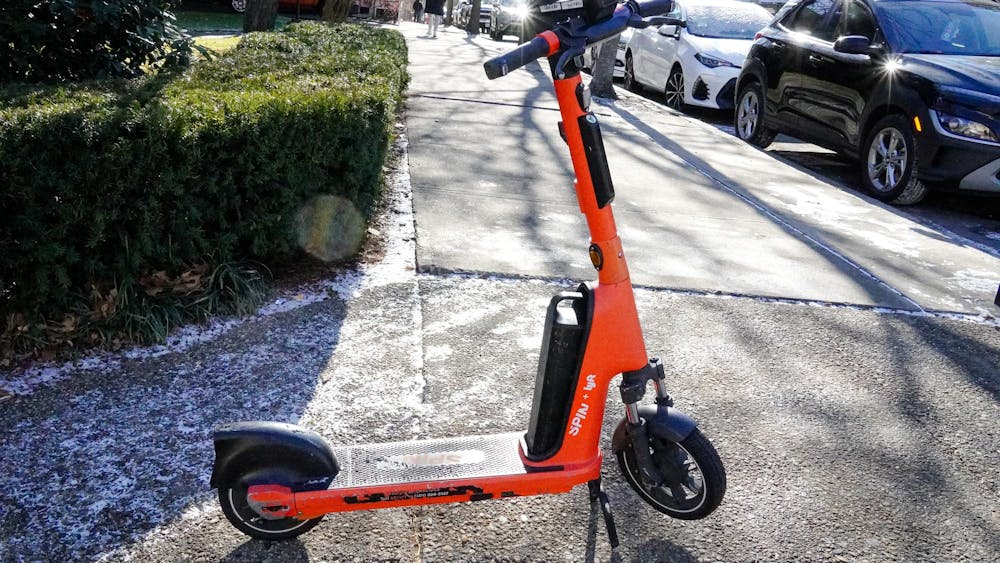Since Spin’s introduction to Providence five years ago, zipping bright orange scooters have become a regular sight on College Hill. With a scan of a QR code, users can unlock a scooter for a $1 fee and ride them at a rate of 41 cents per minute.
Spin is an electric bike and scooter company aimed at providing cities and universities with accessible and sustainable forms of transportation.
Its scooters were first introduced to Providence as part of the city’s 2018 Shared Micromobility Program, which aimed to provide the Providence community with transportation options that enhance access, safety and convenience. Modeled after electric scooter and bike-share programs in other major cities, the initiative solicited applications from transportation providers to implement their programs in Providence.
Five years later, Spin has logged close to half a million rides in 2024, according to Samara Pinto, deputy press secretary for the City of Providence. But while some praised the scooters’ convenience, Spin’s prevalence on College Hill has also raised concerns.
Electric scooters are micro-mobility tools — transportation options that help provide locals with a last-mile option and allow travelers to access other forms of public transport such as buses or trains. Professor of Environment and Society Kurt Teichert MA’15 wrote that by displacing passenger vehicles, micro-mobility options may help reduce congestion and vehicle emissions.
But for Teichert, these benefits are somewhat lost when it comes to Brown students. Since many students use Spin scooters as an alternative to walking, rather than an alternative to vehicles, the micro-mobility options are “not taking the place of a car or other form of more impactful transportation,” Teichert wrote in an email to The Herald.
“They are not necessarily a safer, more affordable option when they are used in lieu of walking,” he added.
Ethan Liew ’28 often uses Spin scooters to get to rugby practice, turning a 30-minute walk to Marvel Field into a 10-minute ride.
Liew cited the scooters’ accessibility as a motivator for his use, adding that “they’re really powerful. And they get me up the slope.”
Still, Liew expressed dissatisfaction over some Spin inconveniences, noting that the scooters can park in “no-park zones,” but users are unable to start the scooters in these zones. “It’s just accumulating a bunch of scooters everywhere,” he added.
Spin did not respond to The Herald’s requests for comment.
Brown and Providence have been working with Spin to ensure the safety of users and prevent the misuse of scooters.
The city “collaborates with Spin to ensure that bikes and scooters are appropriately parked to avoid blocking sidewalks,” Pinto wrote in an email to The Herald. She added that the Spin app also encourages a variety of safe practices like restricting one rider to each scooter and adhering to traffic regulations and speed limits.
In fiscal year 2023, Brown signed an agreement with Spin to support the safe use of scooters for members of the Brown community, wrote Amanda McGregor, the deputy director for news and editorial development, in an email to The Herald. This agreement with Spin aims to keep sidewalks and parking lots clear of scooters, preventing the blockage of entrances for vehicles and maintaining safety for pedestrians.
The University has also supported transportation options like bicycle lanes, bike-share programs and scooter-share initiatives, aiming to decrease emissions from transportation and improve urban mobility, McGregor added.
She noted that Brown is currently reviewing its agreement with Spin, including a review of slow zones and no-ride zones in which the scooter decreases its speed. The Department of Public Safety also works to host education and training sessions on using scooters and bikes, particularly through a safety fair during New Student Orientation and monthly Operation Identification Property Registration programs.
For Providence, “rider safety is a key focus,” Pinto wrote. “We’re committed to enhancing transportation options while prioritizing the safety and convenience of all who utilize them.”





